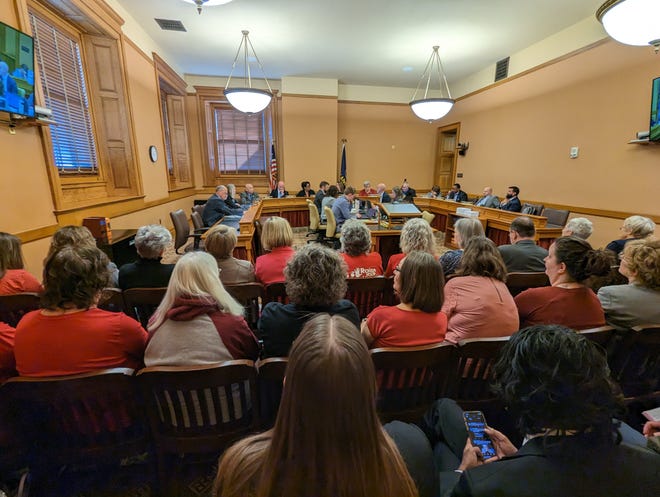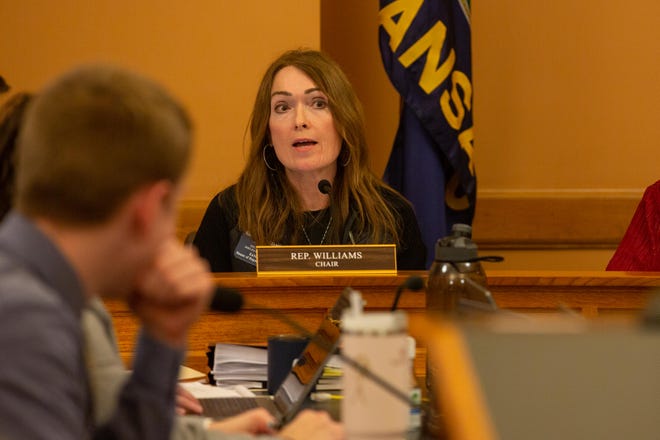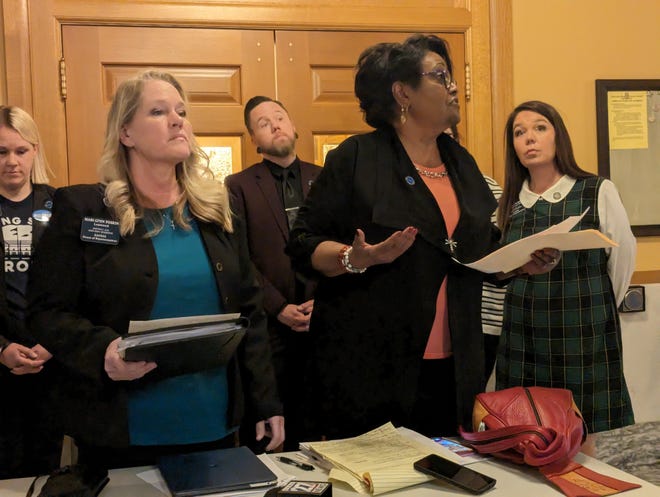Kansas school voucher bill tied to teacher pay increases, SPED funding

Kansas Household Republicans on Monday superior a deeply controversial bill that could reshape the state’s public-personal K-12 education and learning procedure but not just before attaching a couple products that, for many years, have been on Democrats’ would like-checklist for colleges.
The House K-12 Education Finances Committee on Monday labored and innovative SB 83. Originally a Senate Education Committee bill on expansion of tax credit scholarships for very low-money learners, the Property committee “gutted” the contents of SB 83 and changed with them with HB 2218, which would generate a voucher-like education price savings account program.
A lot more:Really should taxpayer cash aid spend for some Kansas families’ non-public college tuition?
Dubbed the Sunflower Schooling Equity Act, the law would make it possible for Kansas people to use taxpayer pounds to spend for non-community educational costs, these types of as non-public college or other academic services and supplies.
The families would acquire 95{515baef3fee8ea94d67a98a2b336e0215adf67d225b0e21a4f5c9b13e8fbd502} of the per-pupil funding their university student would have if not receive if they experienced attended general public faculty, with the other 5{515baef3fee8ea94d67a98a2b336e0215adf67d225b0e21a4f5c9b13e8fbd502} reserved for system administration.
Estimates have been particularly rough as to the charge of the program. A figure well prepared by the Kansas Condition Section of Instruction estimated that the software would value at minimum $151.9 million, assuming all accredited non-public faculty college students and just 1{515baef3fee8ea94d67a98a2b336e0215adf67d225b0e21a4f5c9b13e8fbd502} of Kansas’ 484,000 community university pupils take part.
Amendments since that estimate and still-undetermined administrative fees have designed a murky monetary picture for the system, and Republicans on the committee declined to provide charge projections.
Supporters of the education savings account plan, main amid them committee chair and Augusta Republican Kristey Williams, say this kind of accounts could enable minimal-cash flow pupils, significantly these at the state’s lowest academically doing community educational facilities, go to personal training alternatives.
Additional:With tax credit history scholarship method, Republicans aims to grow Kansas university preference
Critics of the proposed software in the meantime argue that education savings accounts, which function pretty much identically to college vouchers, divert taxpayer funding meant for general public schools to unregulated and unmonitored private educational facilities.
Even further, Democrats on the committee alleged that two amendments additional to the the invoice Monday are “lipstick on the proverbial pig,” intended to entice reasonable Republicans to vote for an normally doubtful invoice.
Kansas instruction price savings account monthly bill would connect teacher wage will increase

The invoice, as amended by the House committee on Monday, would also demand college districts to increase trainer salaries every yr.
At the tail finish of a Kansas Supreme Court docket-approved strategy to restore faculty funding to constitutionally suitable concentrations, the Legislature is now expected to raise faculty funding at the fee of inflation, as calculated by a three-year rolling common of the U.S. Bureau of Labor Statistics’ Buyer Price tag Index for All City Customers in the Midwest Area.
Kansas college districts, under the monthly bill, would be needed use at least half of any enhance in resources to fork out for teacher salary raises.
“Part of my rationale is that this is an inflation-primarily based measure, and our instructors are encountering drastic inflation, so I want to help them out now,” said Rep. Susan Estes, a Wichita Republican who released the amendment.
The modification incorporates a provision that claims nothing in it must be interpreted as prohibiting lecturers from negotiating, but it remains legally unclear if the bill could violate other state rules that delegate payment decisions to negotiations involving community university boards and academics union chapters.
While Kansas Democrats have commonly advocated for increased trainer spend, they balked at what they mentioned was an try to combine policy with funds, especially on training cost savings accounts that they’ve vehemently opposed.
“Our teachers ought to have a lot more,” reported Rep. Jarrod Ousley, D-Merriam, in opposition to the modification. “They are entitled to almost everything they’ve gained, and that is almost certainly not what they are finding — whether it’s regard in the classroom, regard in the committee area or their income routine.”
Exclusive schooling absolutely funded underneath ESA invoice, but at what cost?

Separately, Republicans on the committee tacked on to the invoice a $72 million boost to the Kansas Legislature’s funding for particular education.
Democrats and community faculty advocates for several years have decried the Kansas Legislature’s failure to meet a condition statute that says the Legislature ought to pay back for at minimum 92{515baef3fee8ea94d67a98a2b336e0215adf67d225b0e21a4f5c9b13e8fbd502} of the extra charges of exclusive training, which can involve costly, source-intense services.
The Legislature for the past decade has unsuccessful to fund that obligation at that stage, paying out rather about 70{515baef3fee8ea94d67a98a2b336e0215adf67d225b0e21a4f5c9b13e8fbd502} of people expenses. That is in addition to a federal governing administration failure to pay back for its legally essential share of excess special instruction expenses.
Since unique education expert services are federally mandated, Kansas general public schools argue they have experienced to divert funding meant for basic schooling learners to pay for the pricey exclusive training products and services.
Gov. Laura Kelly’s price range proposal contains that $72.4 million raise as the 1st 12 months of a system to get to 92{515baef3fee8ea94d67a98a2b336e0215adf67d225b0e21a4f5c9b13e8fbd502} of surplus special training prices in five years, at which place Kansas would be paying $362 million far more than it does now.
Dwelling Republicans like Williams in the past have been skeptical of statements that the Legislature has unsuccessful to fulfill particular schooling charges, arguing that other sources of point out funding for general public colleges in the long run insert up to additional than 92{515baef3fee8ea94d67a98a2b336e0215adf67d225b0e21a4f5c9b13e8fbd502} of the excess distinctive education expenses.
Republicans on the committee this year also voted to build a special education funding activity pressure, which Democrats agreed with in basic principle but feared would distract from actual tries to absolutely fund particular training.
“I assume this is good coverage,” claimed Rep. Adam Thomas, R-Olathe, who in addition to serving on the Property K-12 Education Budget Committee, also chairs the Education Committee. “This is a excellent compromise with the governor’s recommendation, and I feel that as we wait around and hold out and wait around to see what the feds will do with specific education and learning, I imagine this is a excellent gesture by the Legislature to include that.”
‘Lipstick on proverbial pig’

Among other scaled-down, technical adjustments to the monthly bill, the committee also designed a amendment that would let Kansas’ smallest school districts the latitude to use the greater of the former four years’ enrollment in calculating overall college students for funding reasons. That’s when compared to the present-day formula for all educational institutions, which only will allow the previous two years.
Rep. Scott Hill, R-Abilene, mentioned he desired that amendment in get to mitigate any potential swings in enrollment little districts with 1A-sized high universities may well expertise from losing even just a handful of learners. Extra than 60 of Kansas’ 105 counties do not have an accredited personal university, even though proponents of the bill argue that education price savings accounts could induce a lot more corporations and people today to open up schools.
A lot more:Kansas K-12 enrollment up somewhat. But it could hardly ever return to pre-pandemic degrees.
Democrats on the committee had been sharply skeptical of Republicans’ about-switch on various of the amendments to the monthly bill, as nicely as what they claimed was an underhanded, opaque process they employed to push as a result of the instruction cost savings accounts.
At a news conference adhering to the committee assembly, Kansas House Democrats explained Republican management was “gaslighting” members of the general public on the difficulty.
“This is the third try this session by yourself to place lipstick on the proverbial pig,” mentioned Rep. Mari-Lynn Poskin, a Leawood Democrat. “Voucher payments are no well known among our Republican colleagues. These colleagues know that vouchers are overwhelmingly disapproved by their personal constituents.”
It stays unclear if the bill will discover more than enough Republican assistance in the entire Dwelling to pass by way of to a conference committee, permit alone no matter if Kelly will signal it. If the governor had been to veto it, a veto override appears even additional not likely.

“Governor Kelly will examine the invoice if it reaches her desk,” mentioned Brianna Johnson, spokesperson for Kelly. “Her precedence is making certain community universities preserve entire funding and have the means they require to provide each individual pupil, which include our specific training college students.”
Meanwhile, Democrats reported they will proceed to drive for assistance for a standalone, unique training funding monthly bill.
“When a 1st-grader is escaping their classroom because of a deficiency of supervision simply because of the universities are strapped for cash, we’ve got troubles, people,” stated Ousley, the Merriam agent. “Once again, I fear that it may consider a further lawsuit to settle if the Legislature isn’t going to want to do the appropriate issue and not enjoy games like this.”
Rafael Garcia is an education reporter for the Topeka Cash-Journal. He can be reached at [email protected] or by telephone at 785-289-5325. Adhere to him on Twitter at @byRafaelGarcia.
